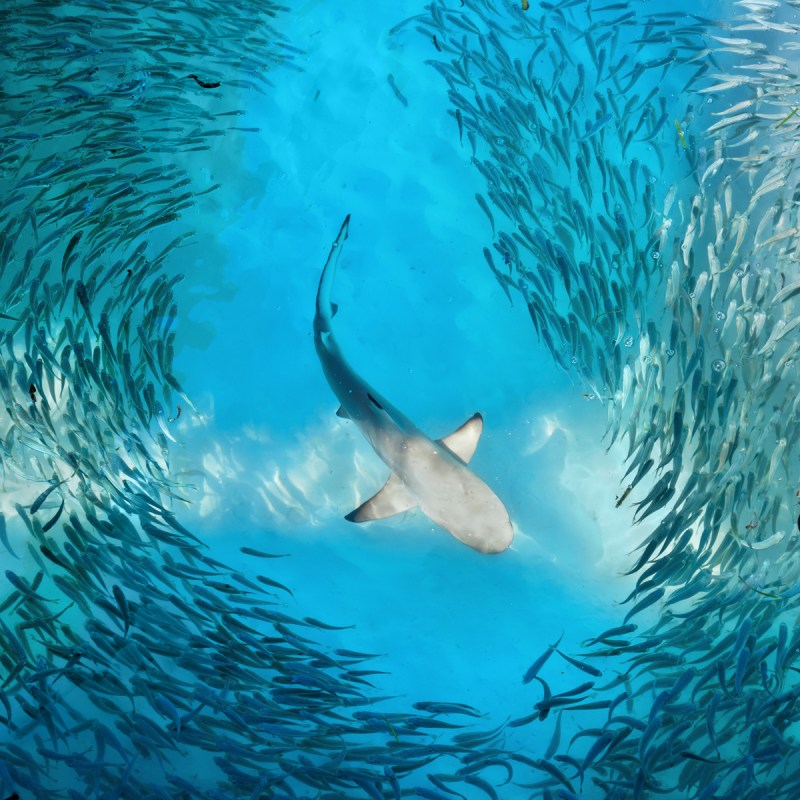
The number of shark attacks around the world decreased for 3 years in a row. In 2021, however, the number of shark attacks picked back up again.
Videos by TravelAwaits
In 2020, there were 52 confirmed shark bites, which was the lowest annual tally in more than 10 years, according to new data published by the Florida Museum of Natural History’s International Shark Attack File (ISAF). In 2021, on the other hand, there were 73 bites, which follows the 5-year global average.
“Shark bites dropped drastically in 2020 due to the pandemic [and its associated beach closures following COVID-19 restrictions],” Tyler Bowling, ISAF manager, wrote in a summary. “This past year was much more typical, with average bite numbers from an assortment of species, and fatalities from white sharks, bull sharks, and tiger sharks.”
Florida, as it has for years, led the world as the place where the most shark bites occurred. In fact, there were 28 unprovoked shark bites in Florida last year compared to 19 in the rest of the U.S. and 26 outside of the U.S., according to data from ISAF.
What’s more, of Florida’s 28 unprovoked shark bites, 63 percent — or 17 bites — took place in Volusia County, which includes Daytona Beach.
Two Types Of Shark Bites
There are two types of shark bites: unprovoked and provoked bites.
“Unprovoked bites are defined as incidents in which a bite on a live human occurs in the shark’s natural habitat with no human provocation of the shark,” the ISAF explains.
Provoked bites, on the other hand, are those that “occur when a human initiates interaction with a shark in some way,” ISAF notes. “These include instances when divers are bitten after harassing or trying to touch sharks, bites on spearfishers, bites on people attempting to feed sharks, bites occurring while unhooking or removing a shark from a fishing net, and so forth.”
The ISAF investigates all reported shark bites, but it pays particular attention to unprovoked bites. That’s because studying these incidents helps researchers better understand natural shark behavior, which, in turn, leads to the further development of mitigation strategies so humans are bitten less frequently.
Shark Bites Around The World
Of the 73 unprovoked shark bites in 2021, 64 percent – or 47 bites – took place near U.S. shores. Of those, all but five took place along the Atlantic Seaboard.
The ISAF explains that there are two reasons why so many unprovoked shark bites occur in Florida. First, Florida has the second-highest rate of population growth in the U.S., ISAF notes, which means there are a lot of people in Florida. Secondly, going to the beach is an increasingly popular activity. The combination means the number of people at beaches in Florida continues to grow quickly.
Australia, as has also been the case in recent years, was the country with the second-highest number of unprovoked shark bites in 2021 — with 12 bites, the ISAF data shows. Three unprovoked shark bites took place last year in both Brazil and New Zealand. One unprovoked shark bite also occurred in Canada, Ecuador, and St. Kitts and Nevis last year.
Who Was Bitten, And Where
Following the expected trend, most — 51 percent — of the people receiving unprovoked shark bites were surfers and people participating in board sports. This group may unintentionally attract sharks by splashing and paddling. Swimmers and waders were involved in 39 percent of the incidents, and the remaining people were either snorkelers/free divers or body surfers, according to the data.
The reason surfers and boarders are so frequently bitten by sharks is that they are on the water in and around surf zones. “This thin strip of water, where inbound waves that may have traveled for hundreds of miles finally snag on the rising coastal sea floor and topple over, creates the perfect environment for surfers and sharks alike,” ISAF explains.
“Marine coasts and estuaries are a favorite feeding ground for a variety of fishes, which take advantage of the tides to scope out new food and rummage near the shallow seafloor for plants and invertebrates,” ISAF continues. “These smaller fishes, in turn, attract sharks, which sometimes mistake humans for prey.”
How To Stay Safe
The good news is that, considering the growing number of people at beaches and in the ocean, the total number of unprovoked shark bites each year is extremely low.
One reason both the risk of, and the incidence of, unprovoked shark bites is low stems from increasing education about how to avoid shark encounters in areas they are known to frequent. For example, ISAF provides numerous suggestions for ways to decrease the chances of being bitten by a shark, including to avoid splashing in open water because sharks may mistake that activity for that of a struggling fish. Other tips to avoid the risk of being bitten by a shark are to stay close to shore, avoid swimming at dusk or dawn, and don’t swim around schools of fish or where people are fishing.
You can find more tips for being safe and decreasing the chances of being bitten by a shark here. To protect yourself, your gear, and your catch from sharks while fishing, check out Sharkbanz, the world’s first shark-deterrent tackle.
For more travel news and information on sunny Florida, check out these recent stories:
